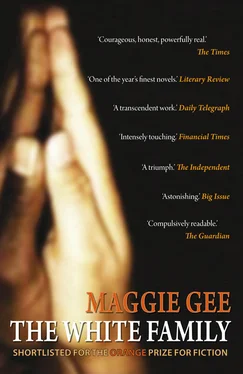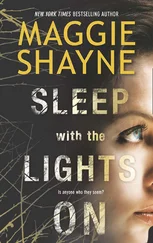‘A man’s never too busy to be interested in women. The girls at that college aren’t real women.’
‘Oh come on, Elroy —’ He could be impossible.
‘A good woman settle Winston down. Maybe you can fix him up with someone. Do you know any good Christian women round his age?’
‘He could meet them at the church, any time. If he wanted to, that is —’
‘He don’t even come to church regular. I don’t know what it is with him.’ Elroy had begun to sound fretful. ‘Sometimes I think I’m a stranger to my brother.’
‘But you two are so close,’ she protested. They hugged and joked and fought a lot, a play-fighting Elroy always won, being nine years older and twenty pounds heavier. Elroy’s kind of closeness was not about words.
‘Skeen, Shirley, he’s my little brother. I always look after him, since he is a baby. I’d kill anyone who hurt my brother. But he need a good woman to care for him.’
They had passed the Ritz, which was still asleep, and came to the air and light of Green Park, the leaves unfolding on the trees to their left, two children suddenly cutting across them in the middle of some chasing game, a deck-chair attendant rubbing his nose. He spat on the pavement. It lay in the sun. One of the boys was panicking, screaming –
Further down was the Sunday Art Market. Paintings hung in packed rows on the railings. The crowds thickened up, became a forest, and Shirley and Elroy’s talk fragmented.
‘What would you think —’ Shirley began, as Elroy stared up at a painting of deer, hung slightly too high for them to see clearly, dun dappled bodies leaping, free (could she and Elroy ever live in the country?) ‘What if, you know, Winston didn’t like women?’
But Elroy couldn’t, or wouldn’t, understand her. ‘We see him in church this afternoon. Now you start thinking of a woman for him.’
It wasn’t her business, in any case. But what was it, she wondered, about black people and homosexuality? It was as if they thought only white men did it. Even Kojo, who was liberal about most things, had been very uneasy around gay men. She remembered Elroy’s grimace of distaste as they walked down Regent Street one day and a flamboyantly handsome black man erupted out of Liberty’s, laughing, his arm round the shoulders of a fat older white man with streaked blond hair and tiny dark glasses that made him look slightly piggish, admittedly. Elroy had winced with distaste as they passed, then said, when they were still within earshot, ‘ Cha , look at that battyman! How much do you think Piggy’s paying him?’
Did everyone have to despise someone?
‘He’s too young to be married,’ she said, making peace. ‘Let him get his degree. Then you’ll all be proud.’
‘First one in the family to go to university,’ said Elroy. ‘My mother going to be dancing with joy.’
They could hardly move in the press of people milling forward to see the paintings. Here she and Elroy were happily invisible. Some black-hooded Arab women pushed and exclaimed, three African girls in reds and oranges swooped and skittered like graceful flamingos, an American couple in small cotton sun-hats twanged and complained and stuck close to each other …
‘There must be thousands of people here,’ she said over her shoulder to Elroy.
‘Lots of people like paintings,’ he replied, ‘long as they not shut away in museums.’
‘If only all this lot would come to church. Imagine Piccadilly jammed solid like this, with people coming to the morning service.’ She was joking, really, but Elroy lit up.
‘One day they will. His Kingdom come. The revival’s coming, Shirley. Must be. The Lord’s not slow in keeping His promise …’
‘I hope you’re right.’ She looked away.
‘You people have little faith.’ He said it with sudden bitterness.
‘What’s the matter, Elroy? You know I believe.’
‘You people don’t need to, though, not like we do … is just a luxury for you.’
‘It isn’t true. Jesus saved my life.’
There was a long silence; she could see he was sorry. When he spoke again, he had changed the subject. ‘I just get vex when I think about Winston.’
She knew what he’d said was partly true. It was black people who read the Bible on the tube, black people, mostly, who drove the cars with ‘Jesus Saves’ stickers on the windows.
They need the Kingdom more, she thought, because they don’t have enough on this earth.
She turned to Elroy without thinking about it, looked at the sun on his handsome face, severe and sculpted, not an ounce of soft flesh, and rested her head against his shoulder. ‘You’re a king to me, Elroy.’
‘And you’re my baby.’
And when they got home they made love again, with a blind concentration and hurry, then, as if death were stalking them, and time was short, but after they were finished they fell asleep, and woke an hour later in a panic race to fling their clothes on and drive to the Temple.
Two churches in one day. Can’t do better than that. Perhaps I’ll be forgiven for two men in one night –
They always met Elroy’s family at the Temple. They glanced quickly into the nave of the church, packed with people, as it was every Sunday, but no one was looking round for them, and Elroy’s mother always did, glasses glinting, a deep frown in her forehead under tight grey-black coils of plaits, not relaxing until all her offspring were there.
‘Must be upstairs, then,’ Elroy said. On the stairs she felt his hand patting her buttocks.
The gallery was like the circle of a theatre. The warmth hit you first, a surprising warmth when the Temple itself was high and stone-built. It was the warmth of hundreds of bodies, the majority black, but a true mixture, brown, pink, olive, yellow, old and young, Chinese, Japanese, even a few Indian faces. The whites who were there did not look rich, wearing anoraks or faded coats, the women with gleaming un-made-up faces, a striking contrast to the chic and gloss of the young black women in the congregation. More women than men. Always more women. Perhaps they came to pray for the men. Or to pray for deliverance from the men?
Electric organ played softly in the background, sweet, faintly mournful, modern. And the sadness rose in Shirley again, she saw her father’s small face on the pillow … Shaking herself free, she looked round for Elroy’s family. Beside two empty spaces she suddenly saw Sophie, waving her arms, beaming, mouthing, her arms and legs always remarkably thin besides her bulky, comfortable body, Elroy’s mother who had come over in the fifties to be a nurse, but ended up a cleaner. Almost from the start she had welcomed Shirley.
‘Elroy! Come on! We waitin’ for you.’
Winston wasn’t there; that’s what Shirley noticed first. The sisters were there, Viola and Delorice, Delorice clamped to her exquisitely dressed baby, a little girl in layers of ribboned peach frills, and Viola who managed the boutique in Kilburn, in a tight, waisted black suit and high lacquered hair glued flat to her head in sharp strands and kiss-curls. Delorice, the youngest, was rather shy, jobless since she had a screaming row with Viola because she brought the baby to work with her. Sophie had told the whole story to Elroy, gasping with laughter — ‘Your sistas killin’ me, Elroy! Viola get so miserable sometime, she done shout at Delorice dat she no havin’ no stinky doo-doo in she shop …’ Now the two sisters were devoted again but Viola wouldn’t have her back in the shop. And Viola, as Shirley knew only too well, was in the process of divorcing a white man, a college lecturer. He had seemed adoring until they were married, ‘the perfect man’, as Viola said, but soon became unfaithful, then abusive, and finally horribly violent. ‘He just a little dog,’ Viola had told Shirley, rubbing her face in all the details, making her suffer because she was white too.
Читать дальше












